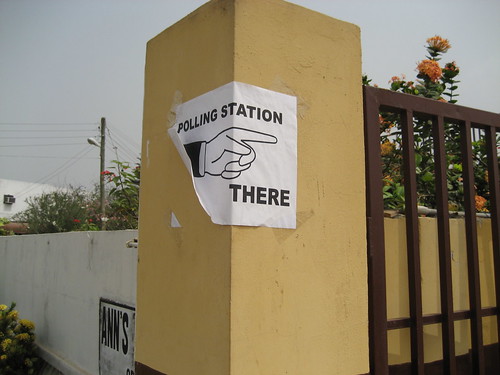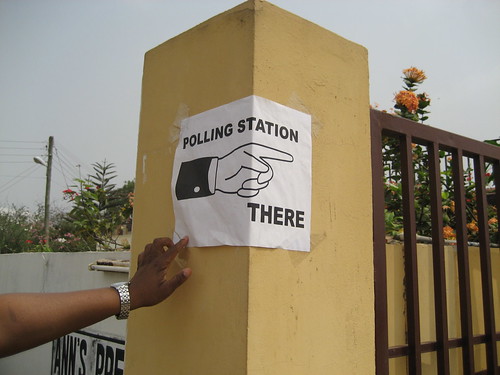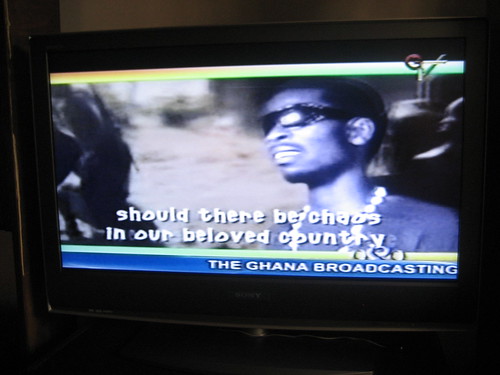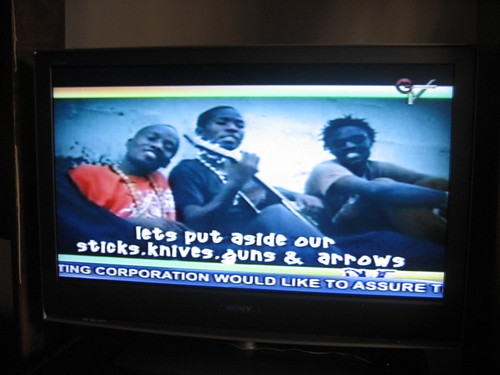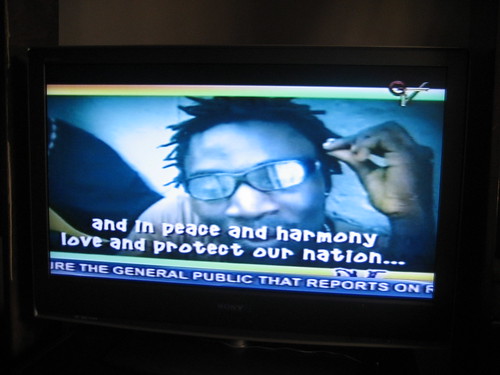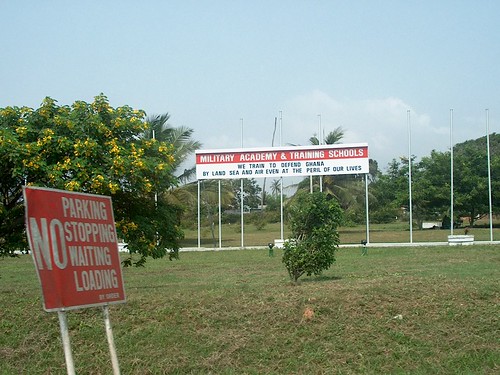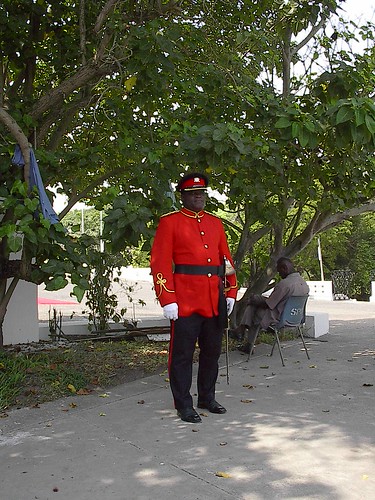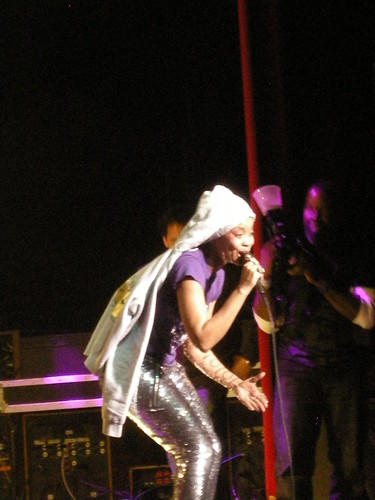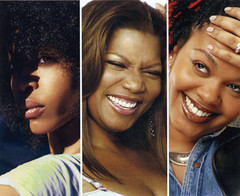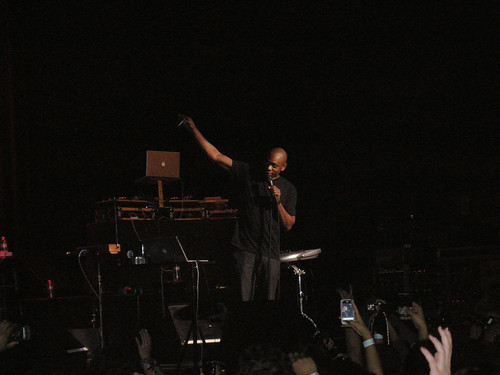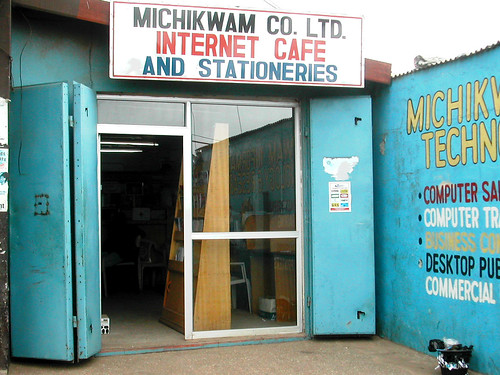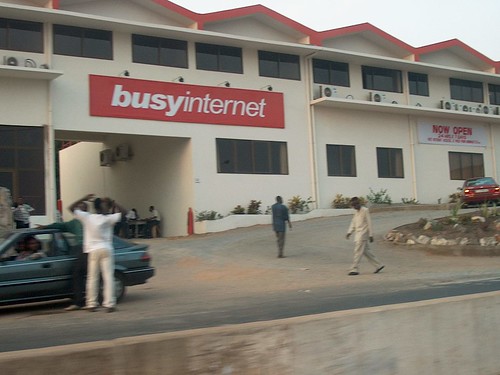Electoral Fictions
Shamelessness is an essential component of the how to hand over to yourself blueprint but, as our Ivorian brethren are currently demonstrating, there is still room for innovation within that framework, and depths of crassness that can yet be plumbed. We live in a world of politics as theater and where elections are the ultimate in stage-managed human drama. Suspension of disbelief is essential in any fiction, and disingenuousness mandatory in electoral fictions.
I write this of course after watching events in Côte D'Ivoire over the past few weeks. The initial emotion was bemusement and indeed laughter - how can one not laugh at the spectacle of someone literally tearing up election results to prevent them from being declared. Still the inept antics only brought back the automatic, unrequited cringe I've had at Ivorian politics for the past decade. I remembered that I'd even awarded Laurent Gbagbo, his wife and their death squads an award of sorts, and looking over their 2004-5 citation, all the elements were there: the needless waste of everyone's time, the hubris, the threats and the violence. Still I have been holding my breath, a neighbour's house is still on fire.
Of course we've long since moved beyond laughter to the realm of tears. It's the usual litany, the West African yearning for normalcy: why should the conduct of elections be cause for fraught headlines? Why seal borders? And those death squads and the obligatory evacuation of foreign nationals? And so forth, it's a depressing lament. Most Ghanaians are gearing up to receive the refugees who have already started leaving the place. Sidenote: if refugees are leaving Côte D'Ivoire to go to Guinea and even Liberia, a country recovering from 14 years of civil war, how many more can we expect in ostensibly stable and oil-producing Ghana?
Incidentally, we were on notice as to how ugly things might turn out. Recall if you will, the September story about that Ivorian man arrested in California attempting to buy arms to smuggle in contravention of the UN embargo. The salient quote:
"$1.9 million wired to the US as a 50 percent downpayment on the weapons... the shipment of 4,000 handguns, 200,000 rounds of ammunition and 50,000 tear gas grenades to Ivory Coast."As you watch the distressing news footage, imagine the additional damage this consignment would have wrought in light of the violence, reports of militias, mercenaries and nighttime disappearances. The fact also that millions of dollars were so readily transferred surely indicates the importance the old government placed on the military option and indeed the kind of planning that was involved (the International Criminal Court should take note). But anyway all that is a matter of ruthlessness, let's deal with lighter topics: shamelessness, political theater and electoral fictions.
We have seen problematic elections in this season - consider Burma as the archetype, or might you prefer the thuggish Egyptian variant held on the same day, or perhaps even the Belarusian just this past weekend. It is striking that Ivory Coast takes the cake even in such abject company. The usual saying goes that "It's not who votes that counts but it's who counts the votes"; we are witnessing new clauses being added to that formulation. Call the Ivorian innovation on this front the Gbagbo Imbroglio, if you will. Their singular contribution to the body of electoral fictions is nothing less than the fictitious election.
The usual practice when handing over to oneself is to hold back declaring results in your strongholds and wait until you know how many votes you need. In Chicago or Kansas City in the past, this was a matter of figuring out how many cemeteries to mine for the requisite ghost names. In Ghana in the 1990s, results from the Volta region always came in suspiciously late, later even than the Northern regions, and 98 percent votes in favour of the incumbent and 100 percent turnout (or more) would be the norm - shades of Mobutu or perhaps referendums in Stalin's time.
Gbagbo and company couldn't manage to do this, indeed the electoral commission that this sitting government had put in place took its job seriously and was remarkably independent - as well it should since a tremendous amount of effort had been put in place by Ivorians and the international community to stage these elections. The resort, then, was to say that the electoral commission did not have the right to declare the results. Which brings me again to that video clip I noted earlier that I've been stewing over ever since (and hopefully the BBC won't mind my using their image, I recommend to everyone their closing line: "the elections have been canceled six times in the past five years."). I haven't seen a more perfect piece of political theater in years. Every actor played their part brilliantly.
When the next day, the head of the electoral commission did manage to sneak out and declare the results, the Gbagbo camp would remark that the declaration was invalid since it hadn't been made within the requisite timeframe. In other words, the declaration that could have been made the prior night had turned into Cinderella's carriage once midnight had passed.
What then followed would clearly demonstrate that Ivory Coast has had a fictitious election.
It would only be after the election results were declared that a 'Constitutional Council' would throw out the votes of 12 percent of the country so that the "results" would be in Gbagbo's favour. Surely this must be the most innovative response to an electoral contest. I can't imagine a greater slap in the face short of actual physical slaps in the face - and these have since been forthcoming.
First for 15 years ago, you say that a large part of your countrymen are not Ivorians, then you say that they are but that they can't register, then you delay for 5 years, then you allow only some to register as you then delay registration and again delay the vote. Then the whole country votes and even your folks vote against you so that the opposition win. And now you go and nullify their votes even though most of the irregularities were in your strongholds. Words fail me.
When Laurent Gbagbo would wrap himself in the flag and declare himself president, it would only bring to mind coronations of yore.
The question at the outset was whether Gbagbo's generals would follow the Burma blueprint and make his opponent, Outtara, an Aung San Suu Kyi of sorts. Burma of course outdoored its own electoral fictions recently - said elections were timed to occur while the Nobel laureate was under house arrest serving her expediently conferred and lengthy sentence. Just to make sure of the outcome, her party was essentially banned in any case.
Earlier on, one wondered if it would it be the Algerian Algorithm that would be applied: simply don't hold the second round since you know how it would go.
There was also the option of the Abacha Abrogation - with Nigerian bluntness, simply call things off.
The Baker barrage - I'm referring to the slickness of the Bush-Gore 2000 business where James Baker was consigliere: run the clock down. Recall that group of Republican lawyer types that stormed counting offices in Florida. Then the Supreme twist - a legal opinion that should not be construed as a precedent, mutterings about irreparable harm notwithstanding.
A close counterpart is the Mugabe Mutation, a variant of the rope a dope: lose in the first round of elections and resort to the 'or else'.
Finally I suppose there is the Lukashenko option
Perhaps six out of nine Belarusian presidential candidates were in jail. One of them, Uladzimir Neklyayev, was beaten unconscious and then dragged away from the hospital wrapped in blankets.
Laurent Gbagbo has already served an extra term as President - five whole years beyond the end of his mandate. We have been on notice as to his willfulness and are watching in almost despair as he does his worst, hoping against hope. I have a pet theory that someone who has been a political prisoner will do exactly what he wants to do (pace Mugabe, and Mandela notwithstanding). It is vain to think he will do otherwise.
The irony is that Gbagbo was on the receiving end of a famously rigged election. When I wrote my 1993 piece, I was in awe of the slick manner in which Houphouët-Boigny had used his considerable powers of incumbency and dealt with his opposition in 1990.
Given all the precedents one had expected a certain finesse or perhaps panache in the electoral strategy. As a Wikileaked cable from the US embassy in Abidjan put it in July 2009, "There will not be an election unless President Gbagbo is confident that he will win it -- and he is not yet confident of the outcome."
As well he should have been. The cable also noted that it was unlikely the elections would be held in early 2010 as expected since Gbagbo would undoubtedly want to preside over the jubilee ceremonies of 50 years of independence. "The prestige and celebrity that goes with hosting such an historic event" was insufficient as we have seen.
All of that came to pass. This was a long game and Laurent Gbagbo has never missed an opportunity to disappoint. The exasperating and novelistic playbook has been followed to a fault. Delay, suborn, browbeat, bludgeon, deny, wrap yourself in the flag, bluster, and, if need, be suppress and kill - those death squads.
We tell ourselves stories about elections, but it isn't often that the reality surpasses the myth. It has been a colossal waste of everyone's time. We have gone from electoral fictions to fictitious elections.
File under: rogues, Ivory Coast, Côte D'Ivoire, strategy, politics, election, fraud, waste, culture, observation, Africa, toli